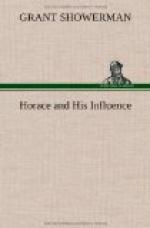The poor man, in spite of poverty, may enjoy life more than the rich. It is possible under a humble roof to excel in happiness kings and the friends of kings. Wealth depends upon what men want, not upon what men have. The more a man denies himself, the greater are the gifts of the gods to him. One may hold riches in contempt, and thus be a more splendid lord of wealth than the great landowner of Apulia. By contracting his desires he may extend his revenues until they are more than those of the gorgeous East. Many wants attend those who have many ambitions. Happy is the man to whom God has given barely enough. Let him to whom fate, fortune, or his own effort has given this enough, desire no more. If the liquid stream of Fortune should gild him, it would make his happiness nothing greater, because money cannot change his nature. To the man who has good digestion and good lungs and is free from gout, the riches of a king could add nothing. What difference does it make to him who lives within the limits of nature whether he plow a hundred acres or a thousand?
As with the passion of greed, so with anger, love, ambition for power, and all the other forms of desire which lodge in the human heart. Make them your slaves, or they will make you theirs. Like wrath, they are all forms of madness. The man who becomes avaricious has thrown away the armor of life, has abandoned the post of virtue. Once let a man submit to desire of an unworthy kind, and he will find himself in the case of the horse that called a rider to help him drive the stag from their common feeding-ground, and received the bit and rein forever.
So Horace will enter into no entangling alliances with ambition for power, wealth, or position, or with the more personal passions. By some of them he has not been altogether untouched, and he has not regret; but to continue, at forty-five, would not do. He will be content with just his home in the Sabine hills. This is what he always prayed for, a patch of ground, not so very large, with a spring of ever-flowing water, a garden, and a little timberland. He asks for nothing more, except that a kindly fate will make these beloved possessions forever his own. He will go to the ant, for she is an example, and consider her ways and be wise, and be content with what he has as soon as it is enough. He will not enter the field of public life, because it would mean the sacrifice of peace. He would have to keep open house, submit to the attentions of a body-guard of servants, keep horses and carriage and a coachman, and be the target for shafts of envy and malice; in a word, lose his freedom and become the slave of wretched and burdensome ambition.
The price is too great, the privilege not to his liking. Horace’s prayer is rather to be freed from the cares of empty ambition, from the fear of death and the passion of anger, to laugh at superstition, to enjoy the happy return of his birthday, to be forgiving of his friends, to grow more gentle and better as old age draws on, to recognize the proper limit in all things:




